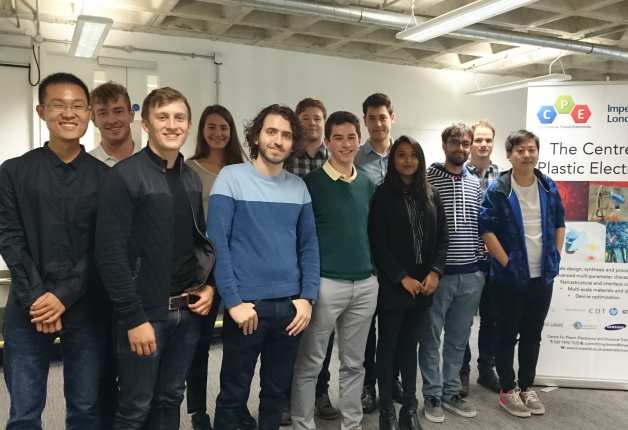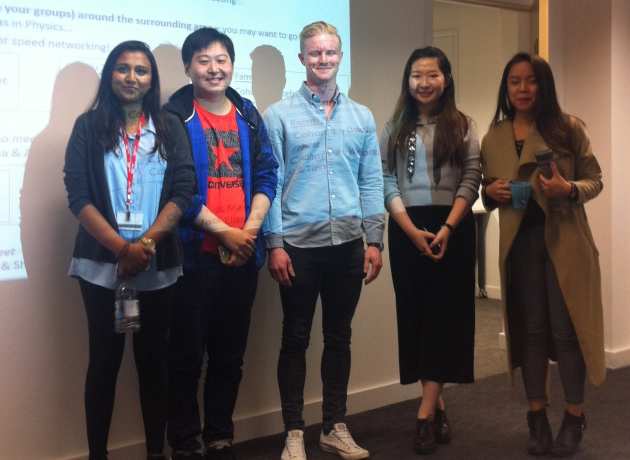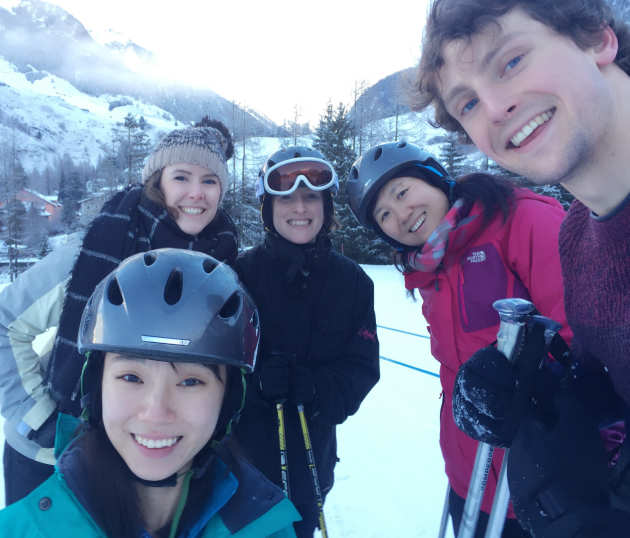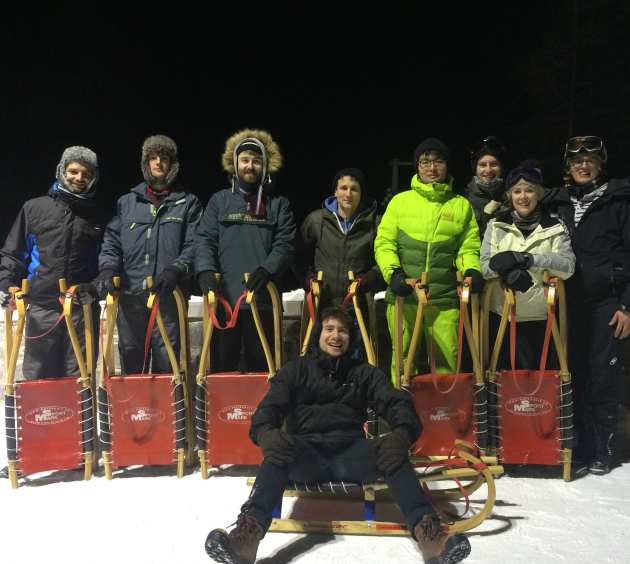 One of the differences between a PhD at a Centre for Doctoral Training (CDT) compared to other routes is that students are grouped into cohorts. Each cohort progresses as a group through the MRes and PhD, collaborating with and supporting one another. To help build each cohort into a tightly-knit group, the Plastic Electronics CDT (PE-CDT) organises various group activities.
One of the differences between a PhD at a Centre for Doctoral Training (CDT) compared to other routes is that students are grouped into cohorts. Each cohort progresses as a group through the MRes and PhD, collaborating with and supporting one another. To help build each cohort into a tightly-knit group, the Plastic Electronics CDT (PE-CDT) organises various group activities.
These activities include outreach and public engagement, group project work, an annual Winter School, peer-2-peer support, and social activities.
Buddy Scheme
 At the students' request, the PE-CDT has worked with cohort reps and other PE-CDT students to develop a brand new, student-led, buddy scheme! The details of the buddy scheme were worked out by the students: students are put into "family" groups, mixing up different cohorts, research groups and departments. Students in one cohort are "parents" of "children" in the cohort below, who are in turn "parents" of "children" in the cohort below them, etc. Buddy groups are intended to provide students with additional support, more opportunities to interact with students from other cohorts, and the chance to discuss life in general outside of the lab!
At the students' request, the PE-CDT has worked with cohort reps and other PE-CDT students to develop a brand new, student-led, buddy scheme! The details of the buddy scheme were worked out by the students: students are put into "family" groups, mixing up different cohorts, research groups and departments. Students in one cohort are "parents" of "children" in the cohort below, who are in turn "parents" of "children" in the cohort below them, etc. Buddy groups are intended to provide students with additional support, more opportunities to interact with students from other cohorts, and the chance to discuss life in general outside of the lab!
The scheme was launched during welcome week in October 2017. Ada Onwubiko and Alice Smith (Cohort 7 students) introduced the scheme to all the other students, who then had their first meetings with their "families". We suggest that parent/children groups meet once per month - or more often.
Winter School

The Annual Winter School takes place in January. The technical programme includes a series of research talks and tutorials from academic members of the Centre for Plastic Electronics, as well as a guest lecture from an invited speaker from another institution. In the evenings, final year students present talks on their PhD projects.
There is free time in the afteroons, during which students can enjoy some of the winter sports activities on offer locally. Students also have to use some of the free time to work on the week-long team project. The project results are presented at the end of the week, with prizes for the best projects.
Outreach
As well as the Outreach component of the MRes course, students are encouraged to organise and take part in public engagement activities throughout the CDT programme.
Each year, a team of students from one cohort within the PE-CDT helps to organise Imperial's Annual CDT Festival of Science. The CDT Festival of Science is a chance for students to present a showcase of current research and scientific issues to the research community of Imperial College. Each Festival has a different theme, and features speakers from a range of disciplines and positions, both from within and outside of academia. The Festivals also provide an opportunity for the twelve CDTs based at Imperial College to interact with each other and gain a more detailed understanding of their respective fields.
Peer-2-Peer support
The PE-CDT pioneered peer-2-peer support. The previous year's cohort provide exam revision sessions for the new cohort. This brings both cohorts together through designing and delivering teaching sessions, and through group learning.
Social activities
 Social activities are very important for encouraging a cohort to form a supportive and friendly group. A welcome lunch for new cohorts with existing cohorts and CDT staff takes place on the first day of term each year, and there are welcome drinks for new cohorts with existing cohorts and CDT staff on the Friday of the first week. A CDT Suite mixer for new cohorts at the twelve difference CDTs at Imperial to meet one other takes place in October. There is also an annual Inter-Cohort Dinner, for which the previous cohort arranges a dinner for the new cohort. To encourage different cohorts to interact and network with one another, there is also an annual ice skating session and Christmas party (arranged by the students). Once a cohort is more established, the students usually organise their own, additional activities.
Social activities are very important for encouraging a cohort to form a supportive and friendly group. A welcome lunch for new cohorts with existing cohorts and CDT staff takes place on the first day of term each year, and there are welcome drinks for new cohorts with existing cohorts and CDT staff on the Friday of the first week. A CDT Suite mixer for new cohorts at the twelve difference CDTs at Imperial to meet one other takes place in October. There is also an annual Inter-Cohort Dinner, for which the previous cohort arranges a dinner for the new cohort. To encourage different cohorts to interact and network with one another, there is also an annual ice skating session and Christmas party (arranged by the students). Once a cohort is more established, the students usually organise their own, additional activities.